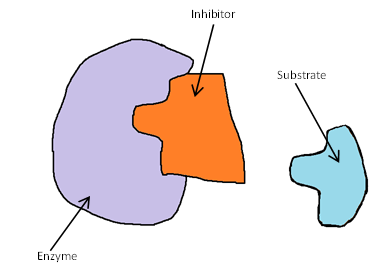


 النبات
النبات
 الحيوان
الحيوان
 الأحياء المجهرية
الأحياء المجهرية
 علم الأمراض
علم الأمراض
 التقانة الإحيائية
التقانة الإحيائية
 التقنية الحيوية المكروبية
التقنية الحيوية المكروبية
 التقنية الحياتية النانوية
التقنية الحياتية النانوية
 علم الأجنة
علم الأجنة
 الأحياء الجزيئي
الأحياء الجزيئي
 علم وظائف الأعضاء
علم وظائف الأعضاء
 الغدد
الغدد
 المضادات الحيوية
المضادات الحيوية|
Read More
Date: 13-12-2021
Date: 2-9-2021
Date: 6-9-2021
|
Enzyme Inhibition
Any substance that can decrease the velocity of an enzyme-catalyzed reaction is called an inhibitor. Inhibitors can be reversible or irreversible.
Irreversible inhibitors bind to enzymes through covalent bonds. Lead, for example, forms covalent bonds with the sulfhydryl side chain of cysteine in proteins.
Ferrochelatase, an enzyme involved in heme synthesis , is irreversibly inhibited by lead. [Note: An important group of irreversible inhibitors are the mechanism-based inhibitors that are converted by the enzyme itself to a form that covalently links to the enzyme, thereby inhibiting it. They also are referred to as “suicide” inhibitors.] Reversible inhibitors bind to enzymes through noncovalent bonds and, thus, dilution of the enzyme–inhibitor complex results in dissociation of the reversibly bound inhibitor and recovery of enzyme activity. The two most commonly encountered types of reversible inhibition are competitive and noncompetitive.




|
|
|
|
دراسة يابانية لتقليل مخاطر أمراض المواليد منخفضي الوزن
|
|
|
|
|
|
|
اكتشاف أكبر مرجان في العالم قبالة سواحل جزر سليمان
|
|
|
|
|
|
|
اتحاد كليات الطب الملكية البريطانية يشيد بالمستوى العلمي لطلبة جامعة العميد وبيئتها التعليمية
|
|
|